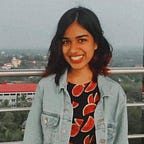A Myriad of Opportunities and WWCD Mentorship 3.0 — Week 2 & 3
Week 2 & 3 of Women Who Code Delhi’s Mentorship Program 2021
The Women Who Code Delhi (WWCD) Mentorship Program 3.0 kicked off on Sunday, January 31, with an introductory meeting on the program requirements and schedule. As an initiative that aims to help as many women as possible, the organizers requested the participants to document their weekly tasks and experiences so people who were unable to take part could benefit from these blogs! Another benefit that the organizers stressed upon is building an online presence for the mentees and learning how to articulate your technical or non-technical experience in a cohesive manner through these blogs.
The WWCD 2021 Mentorship Program is divided into 5 weeks, with Week 1 being focused on introduction to the program and the mentors. I met my mentor, Brihi Joshi and co-mentees in a session where we discussed our goals and expectations from the program. Within the first session itself, I found the amount of confidence and dedication towards the community that Brihi exuded, absolutely contagious. My co-mentees too, were full of intelligent questions! Some of the topics that I’m touching upon in this article are from the discussions between Brihi and other mentees.
Week 2: Internships/Jobs
In this particular week, we went over our specific internship/job interests. Brihi, skillfully divided these opportunities in three categories: Software Development, Research Based and Open Source opportunities.
In Dev opportunities, as would be well known by now, Data Structures and Algorithms play a significant role and make up for the large part of the selection process. For Research Based internships at universities, the selection process can vary based on different professors and labs. Open Source programs like Outreachy and GSoC are great for building experience and understanding the lay of the land!
In most of these internships, there is immense possibility of growth and learning, and often help you get your foot in the door to a lot of opportunities through what you learn and who you meet here. However, for these experiences, you have to actually apply to these opportunities and not “self-reject.” When showed a job opportunity where we all knew the primary language and possessed overall two out of the four required skills, all of the mentees self rejected and said that they would not apply to the job. This, Brihi pointed out is the wrong approach to internship/job applications and explained the difference between primary requirements for a job and ones that can you can learn on the fly.
Week 3: Scholarships for Women in Tech
In a detailed discussion on essay questions that come up in the most scholarships or at least the most popular ones (WTM), Brihi shared tips on how to talk about your experiences effectively:
- Add Testimonials, a colleague might have written a recommendation on LinkedIn or a mentor, peer or mentee might have praised in a social media post or a blog much like this one, you can (with permission, if necessary) add direct quotes! This provides credibility to the claims you are making in your application.
- Add hyperlinks, whether is it is a project or community work that you’ve been a part of, evidence, a solid proof you conducting that activity and redirecting the reader to a page where they can explore and learn more about it is a huge plus!
- Share numbers, say you increased the accuracy of a model by 5% or you conducted a technical workshop which had, 100 attendees, providing these numbers helps the reader understand the impact of your work. I did too learn this in sessions with my seniors and it has proven to be extremely helpful in terms of even my resume!
- Bold it! When you are stressing on a point, an organization or an experience, it’s a good idea to provide some formatting to your document and make sure the reader can notice the important points you are making.
- Mention your growth. Often when people talk about their experiences, they talk about what they did as a part of that activity and forget to mention how it helped them grow or what they learned. Brihi gave us the example of her experience with WWCD itself, and how in one paragraph she’d mention how she’d contributed to the community and in the next one, how the community had helped her.
- Get it reviewed, this can be anyone who knows you well, a past scholarship winner, or a senior. Brihi is a past WTM scholarship awardee and suggested that key here would be to make sure that you iterate over your essays quickly. In every iteration, you finish the entire set of essays completely, and as when you get more ideas or reviews, you edit, delete, re-write!
Akanksha Talwar, the organizer of WWCD Mentorship 2021 and a Google WTM Scholar, shared a comprehensive guide to the application that can be found here.
Staying true to the title of the article, here’s another resource: a repository of internship/scholarship opportunities (Courtesy of ACM-W Manipal)
More Blogs from the Mentorship (that have resources from different mentors!)
If you want more perspectives into the tips that Brihi provides, read my co-mentee, Charanjeev’s and Priyanka’s blogs!
Women Who Code Delhi has also created a repository of where blogs by mentees of each mentor will be updated which is perfect if you want to see what all the other mentors are talking about in their sessions!
